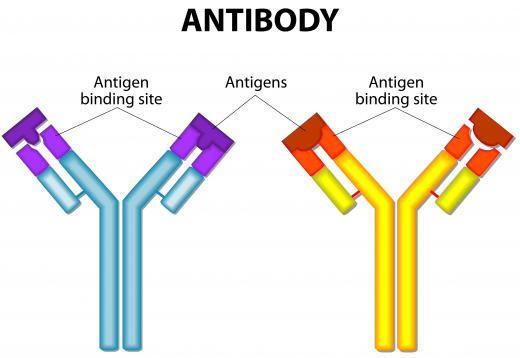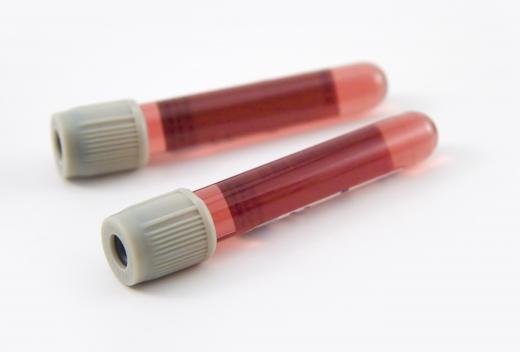What is a Protein Antigen?
 Mary McMahon
Mary McMahon
A protein antigen is a protein which can stimulate the production of antibodies by the immune system, and to which the immune system will react if it is identified in the body. Antigens can be made from a number of compounds, with protein antigens being among the most common. Numerous protein antigens have been identified by researchers who are interested in the immune system and the process of disease, and antigens are used extensively in research, diagnosis, and medical treatment.
An exogenous protein antigen is a protein produced outside the body by another organism. An example might be a protein made by a virus which someone ingests. When the immune system sees this protein, it recognizes it as foreign, and stimulates the production of antibodies which can latch onto and attack the antigen. This is one of the body's lines of defense against agents of disease.

Endogenous protein antigens are produced inside the body. They are very commonly seen in cell death. Cells in the body can program themselves to produce these antigens so that the immune system knows when it is time to break down a cell and recycle its components. This type of protein antigen can also be used by the immune system to tag infected cells for destruction.

Another type of protein antigen is an autoantigen. Autoantigens are substances which are normally found in the body and normally understood to be harmless which the body begins to identify as an antigen. Autoantigens are involved in autoimmune disease, in which the body starts attacking itself because the programming of the immune system goes awry. In this case, a protein which is actually part of the body is judged harmful by the immune system, and the immune system works to eliminate it even though this may cause injury to the body.
Vaccinations can involve the controlled introduction of an antigen, often a protein antigen, to the body to allow it to form antibodies without exposing it to the risk of disease. Antigens can also be used in tests; if a doctor suspects that a patient has a particular virus, for example, a blood sample can be introduced to a selection of antigens to see which antigens it binds to. Identification of antigens can also be important for blood tests conducted to determine whether or not some is resistant to a disease, or whether someone has been exposed to a disease.
AS FEATURED ON:
AS FEATURED ON:












Discussion Comments
@EdRick - Imagine that a virus is wearing a nametag. The nametag is its antigen, its identifier. Then the vaccine is like a picture of that nametag. Imagine the vaccine showing that picture to the immune system and saying "Hey, if this guy shows up, show him to the door."
Then, when the virus shows up with his nametag on, the immune system jumps right on him.
But if you have not been vaccinated, the immune system hasn't seen that picture (i.e., has not been exposed to the antigen before). It has to wait for the virus to cause trouble before it knows what to do. Now, then if you get the same virus again, the immune recognizes the antigen and leaps right into action so you don't get sick.
How does a vaccine introduce something that makes you sick without actually making you get sick? I get that vaccines are really important and save a lot of lives, I've just never been really clear on what a vaccine *is* and how that benefits you.
Post your comments